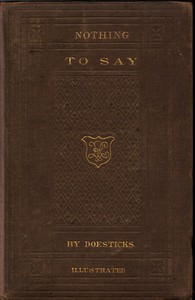Nothing to Say by Q. K. Philander Doesticks
"Nothing to Say" by Q. K. Philander Doesticks is a satirical poem written in the mid-19th century. This work serves as a critique of societal snobbery and the false judgments often made about wealth and virtue during the era. Through humor and allegory, the author addresses themes of class distinction and hypocrisy, particularly focusing on the perceptions surrounding the wealthy versus the poor. In "Nothing to Say," the narrator introduces a character
that symbolizes societal prejudices against those who are affluent, suggesting that the wealthy are often unfairly vilified as uncharitable and morally corrupt. The narrative unfolds through a conversation between a character named Charity and the embodiment of mobocratic snobbery, exploring real-life philanthropic acts that contradict these stereotypes. As they journey through various settings, Charity highlights the efforts of the wealthy in charitable activities, challenging the notion that virtue is exclusively found among the "poorest." The poem concludes with a reflection on true honor and morality, suggesting that both rich and poor play critical roles in philanthropy and that superficial judgments often obscure this reality. (This is an automatically generated summary.)
Read or download for free
| How to read | Url | Size | |||
|---|---|---|---|---|---|
| Read now! | https://www.gutenberg.org/ebooks/27299.html.images | 54 kB | |||
| EPUB3 (E-readers incl. Send-to-Kindle) | https://www.gutenberg.org/ebooks/27299.epub3.images | 958 kB | |||
| EPUB (older E-readers) | https://www.gutenberg.org/ebooks/27299.epub.images | 956 kB | |||
| EPUB (no images, older E-readers) | https://www.gutenberg.org/ebooks/27299.epub.noimages | 86 kB | |||
| Kindle | https://www.gutenberg.org/ebooks/27299.kf8.images | 1.3 MB | |||
| older Kindles | https://www.gutenberg.org/ebooks/27299.kindle.images | 1.3 MB | |||
| Plain Text UTF-8 | https://www.gutenberg.org/ebooks/27299.txt.utf-8 | 39 kB | |||
| Download HTML (zip) | https://www.gutenberg.org/cache/epub/27299/pg27299-h.zip | 951 kB | |||
| There may be more files related to this item. | |||||
Similar Books
About this eBook
| Author | Doesticks, Q. K. Philander, 1831-1875 |
|---|---|
| Title |
Nothing to Say A Slight Slap at Mobocratic Snobbery, Which Has 'Nothing to Do' with 'Nothing to Wear' |
| Note | Reading ease score: 72.4 (7th grade). Fairly easy to read. |
| Credits | Produced by Barbara Tozier and Bill Tozier |
| Language | English |
| LoC Class | PS: Language and Literatures: American and Canadian literature |
| Subject | Poetry |
| Category | Text |
| EBook-No. | 27299 |
| Release Date | Nov 20, 2008 |
| Copyright Status | Public domain in the USA. |
| Downloads | 91 downloads in the last 30 days. |
| Project Gutenberg eBooks are always free! | |

